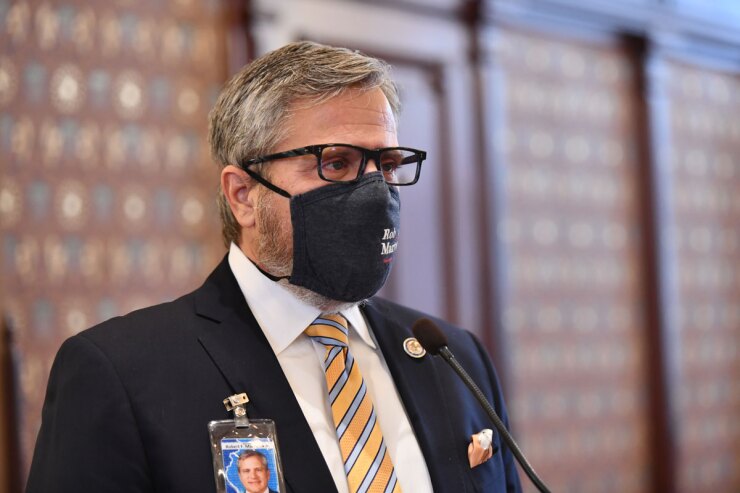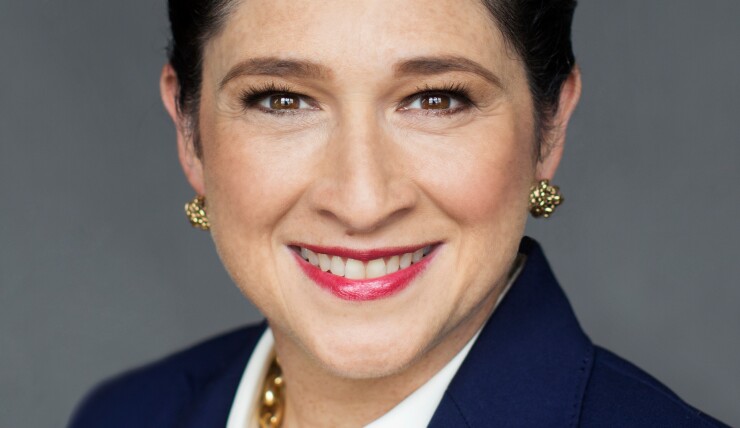Illinois lawmakers could soon cast a final vote on $1 billion of additional borrowing to extend existing pension buyout programs as they eye action on two of the state’s fiscal sore spots — pensions and the rainy day fund.
The Senate Pensions Committee advanced the legislation laid out in HB4292 in a bipartisan vote Wednesday, setting the stage for a floor vote later this month, according to committee Chairman Sen. Robert Martwick, D-Chicago. The measure passed the House Feb. 24 and has Gov. J.P. Pritzker’s support.
"What this bill does is simply authorize the

On Thursday, lawmakers discussed a
“We didn't have any lifelines, not a single one … to help us address the massive public health crisis” when the COVID-19 pandemic hit so the state had to “resort to borrowing to make up for the sudden loss of revenue,” Mendoza said of the revenue crisis brought on by the COVID-19 pandemic.
The rainy day fund held just $60,000 when COVID hit while the backlog reached $6 billion.

A healthy rainy day fund is an “important element on our path toward fiscal stability” and would help manage future “emergencies” and it would serve as a short-term borrowing tool to manage cyclical revenue collections so the state can avoid 12% interest penalties on overdue bills, Mendoza said.
As state lawmakers rush toward an early April 8 adjournment date, the state’s burdensome pension tab and meager rainy day fund are receiving attention in both legislative initiatives and Pritzker’s proposed fiscal 2023 budget. Both are fiscal pressure points that contribute to the state’s weak ratings.
The governor has proposed tapping a revenue surplus and cannabis tax revenue to make an $879 million deposit into the budget stabilization fund with another $500 million going into the pension stabilization fund to supplement scheduled contributions.
Rating agencies have
Buyouts
The pension buyout legislation would extend existing programs begun in 2018 and extended by the legislature in
Illinois’ system, made up of five funds, carries a burdensome
The funds have begun to see an impact, albeit a modest one. As of the end of FY 2021, a $1 billion decrease in the liability came from all the Big 3 systems, according to a
The program offers members in the Tier 1 and Tier 2 group of beneficiaries — newer employees participate in a Tier 3 benefit structure — who no longer work for the state a lump sum payout equal to 60% of the present value of their vested pension benefit to leave the system.
The second offer goes to only Tier 1 members who are still employed by the state and have the option of receiving a lump sum benefit when they retire plus an ongoing annual payment but at a 1.5% non-compounded COLA instead of the compounded 3% COLA they are currently set to receive.
The additional $1 billion should cover payouts for another three-and-a-half years.
Rep. Win Stoller, R-Germantown Hills, who was the sole committee vote against the legislation, said “in a state that is not in the best financial condition taking on debt is not something I’m comfortable with.”
Rainy day
Backers of the legislation HB4118 sponsored by Rep. Mike Halpin, D-Rock Island, hope to see provisions included in the budget implementation bill that will be adopted as part of the fiscal 2023 budget package.
Monthly deposits would be triggered beginning in fiscal 2023 when the backlog falls below the $3 billion threshold. The goal is to reach a balance equal to 5% of general fund revenues, although Mendoza said she’s eventually likely to target 7.5%, or about $3 billion.
Once the rainy day fund is stocked, additional transfers could flow to the pension stabilization fund. Pritzker has proposed a $45.8 billion general fund for fiscal 2023. There’s no cap on the pension fund.
While Pritzker has proposed making the first substantial payment into the rainy day fund in years, backers of the legislation say automatic triggers are still needed to assure attention to the funds long term.
Illinois first established the budget stabilization fund in 2000, according to the legislature’s Commission on Forecasting and Accountability. It was first funded with a $226 million deposit from the tobacco settlement recovery fund in 2001. It received an additional $50 million infusion in 2004.
Deposits into the rainy day fund are currently triggered by projected revenue growth of more than 4% from the prior year, which has not resulted in any material deposits.





